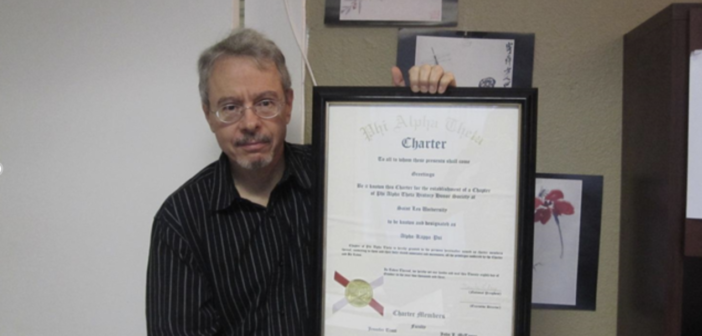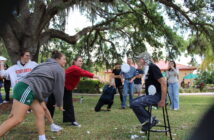BY Tran Mai Khuong, Staff Writer
Phi Alpha Theta (PAT), an American Honor Society, was established in 1921 at the University of Arkansas by Professor Nels Cleven. This is an attractive group history. From the outset to now, PAT has been spread into many famous universities with 350,000 members. Saint Leo University has been a member of PAT since 2003, and there are about 20 professors and students participating in PAT.
The Founder and developing process of PAT
Nels Andrew N. Cleven was born on December 21, 1874, in Lake Mills, Iowa. He began his teaching career in public schools in 1894 before receiving two bachelor’s degrees from the University of Chicago in 1906. He earned his Ph.D. from the University of Munich in 1913 and taught at San Diego High School and Junior College until 1918. From 1918 to 1919, he worked as a research assistant for the War Trade Board’s Bureau of Research and Statistics in Washington, D.C.
While teaching at the University of Arkansas in the 1920s, Dr. Nels Cleven became convinced that a fraternity of scholars (which would accept men and women) was important for the study of history. He invited students to a meeting to form the society (then called the “University Historical Society”) on March 14, 1921, and the society was officially recognized on March 17th. In April, the decision was made for the society to be known by the Greek letters: PAT.
[Text Wrapping Break]In September 1919, Dr. Cleven moved to Fayetteville, Arkansas, after accepting an assistant professorship from Dr. David Yancey Thomas, Head of the Department of History and Political Science at the University of Arkansas. Dr. Cleven and his wife, Hilma, soon found Fayetteville and this unique region of the Ozarks to their liking. They frequently chaperoned the social activities of campus fraternities and sororities, organizations for which Dr. Cleven previously had little regard. These gatherings would inspire what he termed “the PAT idea.”
On March 14, 1921, Dr. Cleven presided over a meeting in his classroom with a group of history students. Those present voted to create the University Historical Society. Officers were elected and Constitutional, Program, and Membership committees were appointed. Even though Dr. Cleven regarded this meeting as the anniversary date for the founding of PAT, it was not until a month later that the name PAT was formally adopted.
Since its inauguration in 1921, PAT has grown to 839 chapters in 50 states, more than any other accredited four-year college honor society. The total number of initiates since its inception is more than 350,000.
In 1962, Theta-Pi, a part of the honor society, was chartered by its founding members: the late William B. Langsdorf, founding president of Cal State Fullerton and professor of History; De Graaf, founding faculty member and emeritus professor of history; Brown, emeritus associate vice president for academic affairs, dean of graduate studies and professor of history; Ernest W. Toy, founding and emeritus librarian and associate professor of history; Beck; Aitken and others. Among those members, Wylie Aitken was so well prepared by his Cal State Fullerton history professors that he did not even need to complete a bachelor’s degree to win a full scholarship to Marquette University Law School more than 50 years ago. Now he is a nationally recognized consumer advocate trial lawyer, and he just received the Orange County Titan Award in March 2011. Aitken said that given the history department’s strong foundation, outstanding professors, and commitment to student success, he is not surprised that Theta-Pi has again been named the top student history honor society in the nation.
In 1996, PAT received recognition as a non-profit organization. The mission of PAT is not only to promote the study of history through the encouragement of research, good teaching, publication, and the exchange of learning and ideas among Historians, but it also seeks to bring students, teachers, and history writers together for intellectual and social exchanges, which promote and assist historical research and publication by members in a variety of ways.
From the outset, this society was estimated one of the best groups for undergraduate and graduate students and professors of history. There have been many prizes and awards given to talented people to promote student interest and love of history. The organization offers a number of prizes and awards for members. The society gives its Best Chapter Award based on student activities, community service, and participation in local and national PAT events. Up to this time, PAT has attracted over 350,000 members with about 9,500 new members joining each year through 860 local chapters.
How Saint Leo University joined in PAT.
“PAT is an organization run by students for students. We invite all scholars and buffs to join in our debates and contribute their own special insights to our group exchanges,” said Dr. Anthony Esposito, assistant professor of history at Saint Leo University.
“Excellence and Community, two of Saint Leo’s core values, are encouraged in the members of the University’s chapter of PAT,” said Jennifer Hawley, MA lead contract faculty – SSC, Co-Advisor, PAT of Saint Leo University.
Saint Leo University’s PAT, which was started in October 2003 with 10 members, has attracted about 20 members. There is a LibGuide link: http://saintleo.libguides.com/PAT created for PAT by the University.
“This participation is in addition to the activities that are sponsored directly by PAT, such as our upcoming Presidential debate, held jointly with Pi Sigma Alpha, the National Political Science Honor Society,” said Hawley.
A group of students was created in Saint Leo University’s PAT. This group is used to help and encourage students to join in PAT activities. It was controlled by President Camara Silver.
“The Honor Society serves a number of purposes, but its most important purpose is to invite people interested in History through trips, speakers, and discussions,” said Silver.
“In addition to our rigorous admission requirements, students are encouraged to participate in University activities,” said Hawley.
In the United States, PAT is an organization that recognizes excellence among peers in various fields and circumstances.
“PAT, the history honor society, is an excellent way for both history majors and other students who are interested in all things historical, to get together and share their ideas and passions about the past.” Dr. Esposito said.
As a member of PAT, students are eligible to apply for the honor society’s awards and scholarships offered each year. PAT awards scholarships and other prizes at the undergraduate, graduate, and doctoral levels.
“PAT encourages students to achieve the Saint Leo University value of Excellence by setting high academic standards for membership,” said Hawley.
All student members are eligible to present a paper at our Biennial Convention and at the PAT Regional Meeting in their area. “In addition, members of PAT are encouraged to actively participate in University activities and are likewise active in planning activities for the society to sponsor,” said Hawley.
“If you have at least a 3.1 minimum GPA in 12 or more credit hours of History courses and at least a 3.0 minimum overall GPA, then you should consider joining the Saint Leo University chapter of PAT,” said Hawley.
PAT encourages student members to apply for one of the following graduate scholarships. To be eligible, members must be entering graduate school for the first time in fall 2013 and must be pursuing a Master’s degree in History. However, students currently enrolled in a graduate program are not eligible to apply.
“Membership in PAT gives students with common interests a chance to meet and expand each other’s knowledge of historical topics,” said Jennifer.
Prizes and awards
In 2013, PAT awards six prizes annually for outstanding papers written by members of the honor society and some scholarships for students. They are:
The George P. Hammond Prize of $500 for the best paper by a graduate student member of Phi Alpha Theta
The Lynn W. Turner Prize of $500 for the best paper by an undergraduate student member of Phi Alpha Theta
The Nels Andrew Cleven Founder’s Paper Prize Awards: two undergraduate and two graduate awards of $350 each for superior papers submitted by student members of Phi Alpha Theta
The A. F. Zimmerman Scholarship of $1,250
The Thomas S. Morgan Memorial Scholarship of $1,000
The William E. Parrish Scholarship of $1,000
If you need more information about the awards and prizes, you can access the PAT website at: www.phialphatheta.org. The application for these above prizes and awards is also available on the PAT website. You also can contact Jennifer Hawley MA, Lead Contract Faculty for Social Sciences and Co-Advisor of Saint Leo University’s PAT chapter, in room 222 in St Edward.





